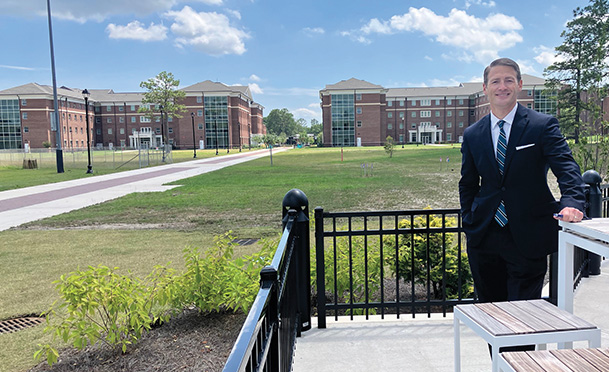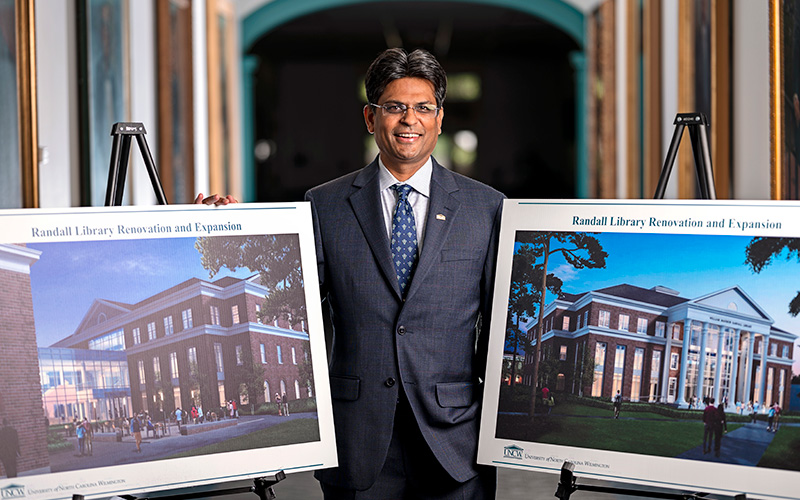Like any organism seeking to survive and grow, a university must adapt and innovate. University of North Carolina Wilmington has done plenty of both in the past few years, meeting or exceeding most goals of its 2016 strategic plan under chancellor Jose Sartarelli despite weathering damage from hurricanes Florence and Dorian and the challenges of COVID-19.
As new chancellor Aswani Volety takes the helm, UNCW officials are poised to assess the institution’s needs, goals and strategies for the next decade or so. With the financial support of an almost-completed $100 million capital campaign and the prospect of a new strategic plan to guide priority-setting, Volety feels confident that the university will continue an upward trajectory.
“UNCW is a very student-centered institution, and we’re doubling down on that,” Volety said recently. “We’ve got fantastic momentum with our new programs. Our core is the liberal arts and sciences, and critical thinking combined with technological skills.”
Volety believes the future of education at the college level will lie in integrated, interdisciplinary programs. He gave as an example the field of drug discovery, which he said is as much computer science and modeling as it is chemistry.
Another example is UNCW’s new coastal engineering major, a niche offering that draws on the university’s strengths in the marine sciences but gives it an important engineering foothold. The new building to house that program, complete with a wave tank, is nearing completion, according to Miles Lackey, vice chancellor for business affairs.
Also benefiting from the facility will be a new doctoral program that launches this fall. The Ph.D. degree in applied coastal and ocean sciences “leverages UNCW’s unique coastal location and has the potential to contribute to the regional and national blue economy,” a university news release states.

Lackey (left), who has overseen a virtual wave of new capital improvements on the campus, believes the new facilities reflect UNCW’s focus on students and what they will need for tomorrow’s careers.
“Our new film center has a 4,000-square-foot sound stage with state-of-the-art equipment and a modern editing room,” he said. “We want our film students to work with the same infrastructure they will when they start their careers. In Veterans Hall [new home of the College of Health and Human Services] – health science students have access to state-of-the-art facilities.”
The Wilmington region is growing faster than other parts of the state, and, according to former chancellor Jose Sartarelli, who retired this year, UNCW is the fastest-growing member of the UNC System. These two facts mean the university must be forward-thinking, Volety said.
“We have to prepare students for jobs that don’t exist yet and offer academic programs this region needs,” he said. “We need to work with Cape Fear Community College on educational offerings. We have our cybersecurity major and our partnership with the UNC School of Medicine, which will provide opportunities to create synergies.”
It’s not just academic facilities that influence the student experience. Lackey points to the university’s four new residence halls, which earned UNCW a “Best New Development” award in May from Student Housing Business Magazine.
The award recognized the facilities’ ability to serve student needs and promote their well-being: housing to “live and thrive in,” Lackey said.
The student quad consists of two traditional-style freshman halls, Sandpiper and Pelican, and two suite-style halls, Loggerhead and Terrapin. Combined, they offer about 450,000 square feet of living space for roughly 1,800 students.
The layout and amenities were influenced by input from students, Lackey said. The same was true for the new Shore Dining Hall, a short trip by foot or skateboard from the housing village.
Shore, which was completed last fall, boasts five serving stations and a massive pizza oven.
“We took student feedback into account on all phases of the project, even the name,” Lackey said. “Shore Dining Hall is a certified green restaurant and a five-star ocean-friendly restaurant.”
Currently undergoing a major renovation is Randall Library, which Volety terms the “academic heartbeat” of campus. He points out that Randall was last renovated in 1987, when UNCW had 7,000 students and when books, microfilm and notepads were the currency of research. Now, with a record 18,000 students and many materials they need online, the future Randall’s 80,000 square feet of space is envisioned very differently.
“There will be more student study and collaboration space, which students are asking for,” the new chancellor said. “The new building will incorporate a lot of natural light and new technology, such as green screens, a podcast room and maker space with a 3D printer. We want to create an atmosphere that really does leverage student ideas and creativity and enable working together on fun projects.”
Some of these capital improvements were already in the pipeline when Volety served as dean of UNCW’s College of Arts and Sciences from 2014 to 2019, so he understands how they align with the university’s goals and what their desired impact will be. He also knows many UNCW faculty and staff members, as well as leaders in the community. While some things have changed in the intervening three years while he was provost at Elon University, he sees these connections as a good foundation.
“The fortunate thing for me is I know a good number of people in the community, and I have worked with arts and cultural and business organizations. Our fortunes are tied together. We have existing relationships and partnerships, so my learning curve is not as steep,” he said. “But the region has changed, and the economy has changed. What are the needs, and how can we help solve them?”
As a marine scientist, Volety is trained to look at ecosystems and the factors that help them thrive and that threaten them. He views the region the same way: the stressors and the opportunities that face Southeastern North Carolina, and how UNCW, working collaboratively with Cape Fear Community College, area businesses and other organizations, can address them.
Within the smaller ecosystem of the university, Volety is focused on enhancing what he sees as UNCW’s strong student-centered approach. Cynthia Demetriou, associate provost for student engagement, enrollment and retention since last October, said she was attracted to her position because the university “builds a supportive infrastructure from recruitment to graduation.
“At some universities it’s a handoff, but from the moment of recruitment, we align our supports and service through to degree completion,” she said. “We don’t want students leaving in debt without a degree; across the country there are tremendous student loan debt problems. We’re very committed, when we admit a student, that we support them throughout the journey.”
A growing number of those students are transfers and veterans, which UNCW sought to attract more aggressively during Sartarelli’s tenure as chancellor. Demetriou and her student support colleagues want to ensure that these non-traditional students get credits – and credit – for what they know.
“Transfers and veterans: they’ve had rich life experiences and coursework,” she said. “We want to make sure that coursework … enhances their degree; that we take their credits and apply them. We are making a lot of relationships with [North Carolina’s] community colleges. We also have to build the infrastructure for students whose experience at UNCW is completely virtual.”
Volety is confident looking at his future mission as UNCW’s head.
“We have the good fortune of a great coastal location, which gives the business and academic communities the opportunity to attract top talent,” he said. “I have a great faculty and staff. When people think about a student-centered institution, I want them to think about UNCW as their top choice.”

 Lackey (left), who has overseen a virtual wave of new capital improvements on the campus, believes the new facilities reflect UNCW’s focus on students and what they will need for tomorrow’s careers.
Lackey (left), who has overseen a virtual wave of new capital improvements on the campus, believes the new facilities reflect UNCW’s focus on students and what they will need for tomorrow’s careers.


